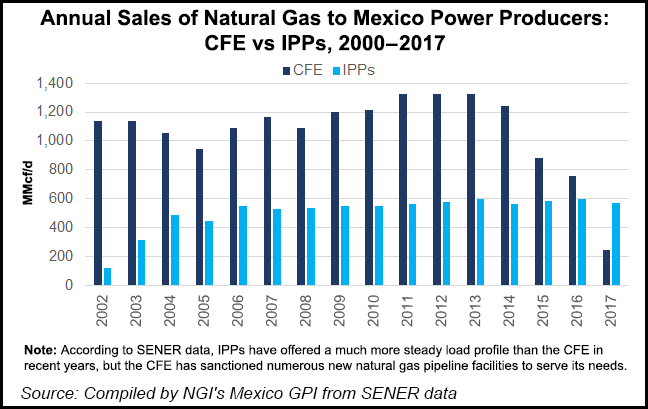Regulatory | NGI All News Access
Fate Of 642 MW Combined-Cycle Plant In Mexico to be Decided Via Referendum
The future of a 642 MW combined-cycle thermal power plant in Mexico’s Morelos state will be determined via referendum, President Andrés Manuel López Obrador told a Friday morning press conference.

Although construction of the $628 million La Huesca power plant, and of an associated 171 kilometer (99.4 mile) natural gas pipeline has already concluded, the plant has yet to enter operation.
The power station in the town of Yecapixtla is owned by state utility Comisión Federal de Electricidad (CFE). The pipeline, which has the capacity to transport 338 MMcf/d, is operated by Spanish firms Elecnor and Enagás, which each hold a 50% stake in the pipe.
The referendum will be conducted February 23-24. Only residents of the 32 towns along the pipeline’s route will be allowed to vote, according to Hugo Eric Flores Cervantes, federal envoy to Morelos.
In his press conference, López Obrador presented a slide showing the only question that will appear on the ballot: Are you in favor of the start of operations at the CFE’s La Huesca thermoelectric power plant?
Although he expressed support of the plant’s operation, López Obrador told reporters that, “we aren’t going to do anything without asking the citizens.”
“During the entire construction period of the gas pipeline there were protests and there was repression of farmers, and some even went to jail,” he continued.
“Fortunately, the plant belongs to the [CFE], to the country, and I say fortunately, because the pipeline is private, from the contracts that were made … with the purpose of privatizing the pipelines, but the plant belongs to the [CFE].”
Both López Obrador and CFE’s CEO, Manuel Bartlett, have criticized a massive buildout of Mexico’s natural gas pipeline infrastructure, commissioned by CFE and executed by the private sector, that began in 2012. They also have expressed opposition to Mexico’s Independent Power Producer (IPP) and long-term power supply auction schemes, both of which entail CFE purchasing electricity from third-party (i.e. private sector) power generators.
“If this plant doesn’t operate, we would have to buy energy from foreign, private companies,” López Obrador said Friday, imploring opponents of the projects to “take this element into consideration.”
Referendums on major public works became a signature of López Obrador’s presidency before it even began. In 2018, during the five-month transition period between his July 1 electoral victory and December 1 inauguration, López Obrador held referendums, or “consultas publicas,” on projects including a $13 billion international airport, an $8 billion oil refinery, and a $6-8 billion train.
The airport, for which construction had already begun, was voted down. The refinery in López Obrador’s home state of Tabasco, meanwhile, received the green light. Approximately one million of Mexico’s 129.2 million people voted in each process.
López Obrador’s government also recently cancelled a long-term power supply auction, as well as a tender for a $1.7 billion transmission line from Oaxaca to Morelos seen as crucial for transporting output from wind farms in Oaxaca to the rest of the country.
A massive shift toward gas-fired power generation is expected to drive growth in natural gas demand in Mexico over the coming years.
However, López Obrador’s administration has expressed support for rehabilitating existing hydroelectric, diesel and coal-fired plants. Bartlett is scheduled to present a detailed plan for the electric power sector in the upcoming week.
© 2024 Natural Gas Intelligence. All rights reserved.
ISSN © 2577-9877 | ISSN © 2577-9966 |
